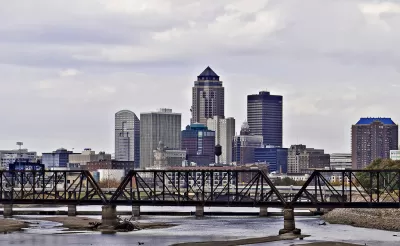As major cities draw in wealth and population, midsized metros may be getting less attention than they deserve. After all, many of their economic, demographic, and political challenges resemble those of the nation as a whole.

For Brookings, Alan Berube makes the case that policymakers and urbanists should devote greater attention to America's midsize metros: places with between 250,000 and 1 million residents.
He discusses research seeking "a middle ground between what urbanist Jason Segedy calls the U-Haul School of Urban Policy—that government policy should focus primarily on enabling people to relocate to places with greater economic opportunity—and the notion that public spending can and should prop up highly economically distressed small towns all across the American landscape." That middle ground may well involve a pivot to places like Des Moines and Cedar Rapids.
Berube explores several reasons why a focus on midsized metros makes sense. For one thing, their scale can make them good testing grounds for policy solutions. "[Midsized metros] arguably retain the requisite scale to offer a distinctive economy and quality of life to their businesses and residents. Moreover, their size may also facilitate the sort of pragmatic, cross-sector problem solving that often bedevils larger metro areas."
Compared to both large cities and rural places, their demographics and politics also track better with those of the nation as a whole. So do some of their economic challenges. Midsized metros are an "especially important feature of the Heartland," Berube notes, and their ability to "successfully navigate racial and ethnic transitions, and to continue to evolve their economies from production to services, may [...] be critical harbingers for our nation's abilities to do so overall."
FULL STORY: Why midsized metro areas deserve our attention

Planetizen Federal Action Tracker
A weekly monitor of how Trump’s orders and actions are impacting planners and planning in America.

Congressman Proposes Bill to Rename DC Metro “Trump Train”
The Make Autorail Great Again Act would withhold federal funding to the system until the Washington Metropolitan Area Transit Authority (WMATA), rebrands as the Washington Metropolitan Authority for Greater Access (WMAGA).

The Simple Legislative Tool Transforming Vacant Downtowns
In California, Michigan and Georgia, an easy win is bringing dollars — and delight — back to city centers.

The States Losing Rural Delivery Rooms at an Alarming Pace
In some states, as few as 9% of rural hospitals still deliver babies. As a result, rising pre-term births, no adequate pre-term care and "harrowing" close calls are a growing reality.

The Small South Asian Republic Going all in on EVs
Thanks to one simple policy change less than five years ago, 65% of new cars in this Himalayan country are now electric.

DC Backpedals on Bike Lane Protection, Swaps Barriers for Paint
Citing aesthetic concerns, the city is removing the concrete barriers and flexposts that once separated Arizona Avenue cyclists from motor vehicles.
Urban Design for Planners 1: Software Tools
This six-course series explores essential urban design concepts using open source software and equips planners with the tools they need to participate fully in the urban design process.
Planning for Universal Design
Learn the tools for implementing Universal Design in planning regulations.
Smith Gee Studio
City of Charlotte
City of Camden Redevelopment Agency
City of Astoria
Transportation Research & Education Center (TREC) at Portland State University
US High Speed Rail Association
City of Camden Redevelopment Agency
Municipality of Princeton (NJ)





























